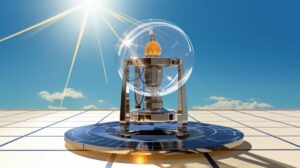When it comes to utilizing solar panels without batteries, remember the saying "Simplicity is the ultimate sophistication." Imagine harnessing the sun's energy directly without the need for storage devices. The concept may sound intriguing, but the practical applications are even more captivating. By understanding the mechanics behind this method, you can unlock a world of possibilities where solar power is utilized efficiently and effectively. So, how exactly can you tap into this direct source of renewable energy and optimize its potential?
Key Takeaways
- Optimize solar panel output by connecting directly to the grid through inverters.
- Ensure efficient energy consumption by aligning high-energy tasks with peak sunlight hours.
- Maximize power conversion efficiency from DC to AC for direct solar usage.
- Prioritize real-time monitoring and smart technology to enhance direct solar power utilization.
Benefits of Battery-less Solar Systems
When considering solar panel systems, opting for battery-less configurations can offer cost-effective and low-maintenance solutions. By connecting your solar panels directly to the grid, you can achieve grid independence and maximize cost savings. Battery-less solar systems eliminate the need for expensive battery storage units, reducing initial setup costs significantly. Without batteries, there is also less maintenance required, as you won't need to monitor or replace batteries over time.
Grid independence is a key advantage of battery-less solar systems. By feeding excess energy directly back into the grid, you can earn credits or even revenue through net metering agreements with your utility provider. This setup allows you to rely on the grid when needed and export surplus energy when your panels produce more than you consume.
Cost savings are another compelling reason to choose a battery-less configuration. Without the added expense of batteries, the overall system cost is lower, making solar energy more accessible and affordable for homeowners and businesses alike. Additionally, the reduced maintenance requirements contribute to long-term savings and a hassle-free solar experience.
Understanding Direct Solar Power Usage
To optimize the utilization of solar energy efficiently, one must grasp the concept of direct solar power usage in grid-tied systems. Understanding solar efficiency is crucial in ensuring that the electricity generated by the solar panels is used effectively without the need for storage in batteries. Direct power applications involve harnessing the electricity produced by the solar panels and using it instantly to power devices or feed back into the grid.
In direct solar power systems, the electricity generated by the panels is consumed in real-time, reducing the energy losses associated with charging and discharging batteries. This direct utilization improves the overall efficiency of the system. By connecting the solar panels directly to the grid through inverters, the generated power can be used immediately by households or businesses, offsetting the need for electricity from traditional sources.
Maximizing Solar Panel Power Output
Maximize your solar panel power output by implementing efficient tilt angles and regular cleaning. To improve efficiency, set your solar panels at an angle equal to your latitude to optimize performance. For example, if you are located at 30 degrees latitude, tilt the panels to 30 degrees for maximum sunlight absorption. This angle helps the panels receive sunlight more directly, enhancing energy production. Regularly cleaning your solar panels is crucial for maintaining peak efficiency. Dust, dirt, bird droppings, and other debris can block sunlight and reduce the panel's ability to convert sunlight into electricity. Use a soft cloth, water, and a mild detergent to gently clean the surface of the panels. By ensuring they are free from obstructions, you can maximize the amount of sunlight reaching the solar cells. Implementing these practices will help you get the most out of your solar panels and increase your energy output.
Efficient Energy Consumption With Solar Panels
To efficiently consume energy generated by your solar panels, it is essential to optimize your usage patterns and prioritize high-energy-consuming activities during peak sunlight hours. By strategically aligning your energy usage with the times when your solar panels are producing the most electricity, you can maximize your self-consumption and reduce reliance on the grid connection. Energy optimization involves scheduling tasks like running appliances, charging devices, and heating water during sunny periods to directly utilize the solar power being generated. This approach minimizes the need to draw energy from the grid, ultimately leading to cost savings and increased efficiency.
To further enhance energy efficiency, consider investing in smart technology that allows you to monitor and control your energy consumption in real-time. By integrating these systems with your solar panel setup, you can make informed decisions about when and how to use electricity most effectively. Remember, the key to efficient energy consumption with solar panels lies in strategic planning and leveraging peak sunlight hours to power your high-energy devices.
Importance of Power Conversion in Solar Energy Systems
Ensuring proper power conversion is crucial for optimizing solar energy systems. Power efficiency is key when converting the direct current (DC) generated by solar panels into alternating current (AC) for use in your home or to feed back into the grid. Efficient power conversion minimizes energy losses during the conversion process, allowing you to make the most of the electricity produced by your solar panels.
In solar energy systems, power conversion also plays a significant role in grid integration. By converting the electricity from your solar panels into the appropriate form for grid connection, you can effectively contribute to the overall energy supply. Proper power conversion ensures that the electricity generated by your solar panels meets the required standards for grid interconnection, enabling seamless integration with the existing power infrastructure.
To maximize the benefits of solar energy systems, it is essential to invest in high-quality power conversion equipment that prioritizes power efficiency and seamless grid integration. By focusing on these aspects, you can optimize the performance of your solar panels and contribute effectively to a sustainable energy future.
Frequently Asked Questions
Can I Use Solar Panels Without a Battery During the Night or on Cloudy Days?
Using solar panels without a battery at night is not feasible as there is no storage system for the energy generated. Solar panel efficiency on cloudy days decreases due to reduced sunlight. Consider a backup power source for continuous energy supply.
What Are the Potential Drawbacks of Using Solar Panels Directly Without a Battery?
When considering using solar panels directly without a battery, drawbacks may include limited usability at night or during cloudy days, reduced efficiency due to inconsistent power generation, environmental impact concerns, and the lack of energy storage alternatives.
Are There Any Specific Types of Solar Panels That Work Better for Direct Usage Without a Battery?
When considering types of solar panels for direct usage without a battery, prioritize monocrystalline panels. Their high efficiency and performance make them ideal for this application. Ensure proper sizing to match your energy needs accurately.
How Does the Cost of a Battery-Less Solar System Compare to a Traditional Solar System With Batteries?
When comparing the cost of a battery-less solar system to a traditional one with batteries, consider factors like energy storage and power optimization. Efficiency analysis is crucial to make an informed decision on your investment.
Are There Any Safety Concerns or Regulations to Consider When Using Solar Panels Without a Battery?
When using solar panels without a battery, safety regulations must be followed to prevent electrical hazards. Efficiency concerns may arise due to lack of energy storage. Consult local codes, ensure proper grounding, and use DC-rated switches for safety and optimal performance.
Conclusion
In conclusion, by utilizing solar panels directly without the need for batteries, you can maximize energy efficiency and reduce costs associated with energy storage. Understanding how to harness and convert solar power effectively is key to optimizing your solar energy system. By following best practices for power generation and consumption, you can achieve a more sustainable and cost-effective energy solution for your needs.



